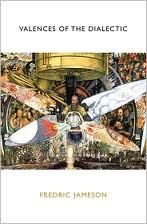I was dreaming…
that I was trying to explain "the dialectic" to someone. I said that it's like if you are showing how thinking about a story about a girl isn't really about a girl. I pulled up an image of a girl, a kind of black-and-white, 1950's photograph of a rather nondescript girl. "This girl looks like… just a girl. But the dialectic is realizing that something else is actually going on," I explained.
I said to my invisible interlocutor, "It's about that moment when you wake up."
And then I woke up. It was perhaps 11 pm. I had fallen asleep with my face in the book – very much not my tendency or habit, these days. I had fallen asleep, while studying.
This was a former character trait of mine; I was reprising it from years ago: it's from old, academic years. It developed due to the inevitable sleep deprivations of graduate school, perhaps.
The air around me was close and thick and hot – my window was open, but the earlier rain had stopped. The florescent light, on in the apartment directly across the alley from mine, seemed extraordinarily, unnaturally bright. It was shining rudely out and illuminating all the unmovingness outside with its overconfident yet highly limited repertoire of wavelengths. I listened to the sounds of the city, vague echoes of a woman singing, buses trundling past on the Jungang-no. I lay very still.
And I lay there, breathing a little bit fast, feeling like I was on the edge of understanding. I felt surprised at how I could have just woken myself up from a dream by suggesting, in the dream, that I could reach a moment of understanding at the moment of waking up. Really, it was nothing short of startling myself awake by confronting the concept of waking up.

The clear image of that story about the girl, from the dream, was falling apart very quickly, like a wet piece of tissue paper. I'm not sure it was important, though. It didn't feel important, at all, to what had just happened. It was arbitrary, I felt myself thinking. I watched myself thinking….
I tried to visualize a slug walking along the edge of a very sharp knife: it just doesn't work. Not funny. What if it was a fly, landing on that edge – would it… hurt itself? I was momentarily embedded in the digression of a Haruki Murakami novel. I'd been working on digressions earlier in the day – my own writing. Polishing a few novelistic digressions, like so much antique silverware – wishing they were whales.
I feel like this strange, crystaline moment hasn't brought me one iota closer to understanding the dialectic; but it was nevertheless a very surprising, lucid dream. It was like an epiphany devoid of epiphanic content. Epiphany for epiphany's sake.
One might ask, why was I dreaming definitions of the dialectic? The answer is not so obscure… I'd fallen asleep reading a recently purchased book: Valences of the Dialectic, by Fredric Jameson. I'm barely to page 15, in the first chapter, which bears the title, "Three names of the dialectic." How about that Diego Rivera on the cover, by the way?
I'll get back to you if I figure it out. I might not figure it out, though. I've not made much progress with feeling comfortable with this essential philosphical tool, [broken link! FIXME] over [broken link! FIXME] the [broken link! FIXME] years. Perhaps I've always invested too much in it. Perhaps, with Karl Popper, I am at core uncomfortable with the seeming solution-in-contradiction. But I'm particularly drawn to it as it is so ancient, so inherent – it's one of the underlying intellectual tools that unifies Eastern and Western philosohpy. It is possibly something innate… even structural, a la Chomsky's "language faculty." A dialectical instinct? The insight presented by the dream, if any, is that there exists the possibility of a sort of recursive definition of dialectical practice.
Hmm… recursion as praxis? That's a whole other post, maybe.

